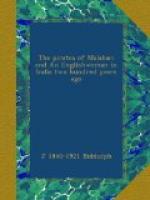It is small wonder that, on his arrival in England, in July, 1724, the wrath of the Directors was kindled against him, and an account of his misbehaviour was forwarded to the Secretary of State. The naval authorities called on the Directors to produce their witnesses for the charge of trading with the pirates. The difficulty of doing so was obvious, as the witnesses were all under Matthews’ command; so the charge was dropped, and the Directors sued him in the Court of Exchequer for infringing their charter by private trading.
Meanwhile the naval authorities had their own account to settle with Matthews; Captain Maine, of the Shoreham, having made various charges against him. In the last week of December, 1724, he was brought to a court-martial on board the Sandwich in the Medway, and the finding of the court was thus recorded:—
“The Court, having read the complaints of the Directors of the E.I. Co. of several irregularities said to be committed by Captain Thomas Matthews while Commander-in-Chief of a squadron of his Majesty’s ships sent to the East Indies, a Publication being made three several times, if any Person or Persons were attending on behalf of the said Directors, in order to prove the several matters therein contained, and not any appearing, the Court proceeded on the complaints exhibited by Captain Covil Maine, and having strictly examined into the several particulars and matters therein contained and heard divers witnesses upon oath, they are unanimously of opinion, that the said Captain Matthews hath in all respects complied with his Instructions, except that of receiving Merchandize on board before the late Act of Parliament, Instituted an Act for the more effectual suppression of Piracy, came to hand, but not afterwards; and it appearing to the Court, that he had sent men irregularly to Merchant Ships, and finding he falls under the 33rd Article of War, they have Resolved he be Mulcted four Months’ pay, and that the same be applied for the benefit of the Chest of Chatham, and he is hereby mulcted accordingly.”
Six weeks later, the Directors obtained a decree against him in the Court of Exchequer, for L13,676 17_s_. 6_d_., which, according to Act of Parliament, was doubled as a penalty.
In 1742, Matthews again found favour with an English Ministry. He was appointed Minister at Turin and Commander-in-Chief in the Mediterranean. In February, 1744, he encountered a combined French and Spanish fleet off Toulon. His behaviour to his subordinates had excited their ill-will to such an extent that his second in command and many of the captains refused to follow him. The allied fleet escaped with the loss of one ship only. Both admirals and five captains were cashiered, and that is the last we hear of Matthews. The remembrance of his behaviour long rankled in the minds of the Directors, and twenty years elapsed before they could again bring themselves to apply for the despatch of a royal squadron to the Indian seas.[1]




